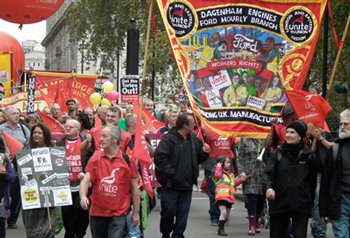

Vol. 78/No. 39 November 3, 2014

|
| Militant/Jonathan Silberman |
| Thousands join trade union march in London Oct. 18, culminating week of national work stoppages and other actions to demand pay raise and protest declining living standards. |
“It’s good to see the solidarity between workers from different unions,” said Brian Oreggio, one of seven butchers from the Tulip meat factory in Ashton-Under-Lyne where workers are resisting bosses’ plans to increase the workday from eight to 10 hours.
The demonstrations culminated a week of national pay stoppages and other actions by workers in the public sector.
On Oct. 13, hundreds of thousands of nurses, ambulance drivers, paramedics and other workers employed by the National Health Service carried out a four-hour work stoppage. (See article above.)
The drive to hold down pay in the NHS is part of the government’s decision in 2010 to reduce government expenditures by £20 billion ($32 billion) through so-called efficiency savings that target jobs, wages and services for working people.
Two days after the NHS stoppage, some 200,000 civil servants, members of the Public and Commercial Services Union, carried out a one-day strike over cuts to real wages.
In 2010 the government imposed a two-year wage freeze on public sector workers, followed by a 1 percent annual raise over the next two years for some.
Dozens of steelworkers from the Tata Steel plant in Scunthorpe also marched. David Sayer, a member of Unite at Tata, said the company plans to sell off its Long Products division. “If the plant closes, some 18,000 jobs are at risk in the area,” he said. “There’s really nothing else in Scunthorpe.”
A delegation of 20 care workers from Doncaster in Yorkshire, members of Unison, marched wearing “Care UK strikers” T-shirts. They have organized 89 days of strike action in the face of wage cuts since February. Another group of Unison care workers — employed by Your Choice Barnet in London — who have been on strike against pay cuts also marched.
Thomas Hemmings, 21, and Steve Geary, 36, who work for the Tesco supermarket chain and marched in a USDAW (Union of Shop, Distributive and Allied Workers) contingent, said Tesco has implemented a new “flexi” contract, which means workers have no guaranteed hours and can be forced to work weekends. “It means that you don’t know how much work you’ll get, what your pay packet will be,” said Hemmings.
“There has been a lot of talk about an economic recovery,” said Rupinder Singh, a council worker and Unite member in the West Midlands, commenting on widely publicized government figures that include an official unemployment rate of 6.2 percent. “But as far as I see it, only a very few are benefiting. The large majority of workers are on the receiving end.”
Most of the touted job gains have been in “self-employment.” More than a third of these newly self-employed earn less than £10,000 ($16,120) per year. Of the rest many are temporary jobs, often on “zero hours contracts,” with no guaranteed hours. Overall, workers have taken a real wage cut of £50 ($80) per week since 2007, according to the TUC, and 5 million receive less than the national minimum wage, which stands at £6.50 ($10.50) per hour for most workers over 21 and between £3.79 and £5.13 for younger age categories.
Related articles:
Health care workers in UK stop work to fight over pay
On the Picket Line
Front page (for this issue) |
Home |
Text-version home